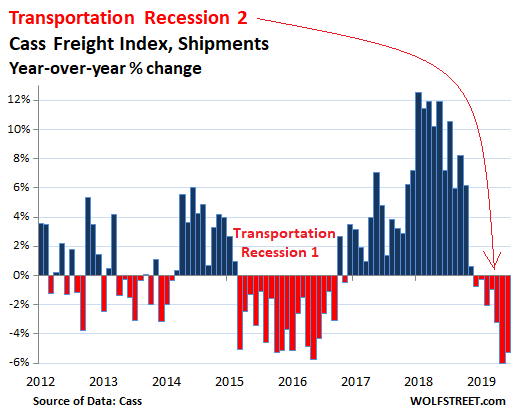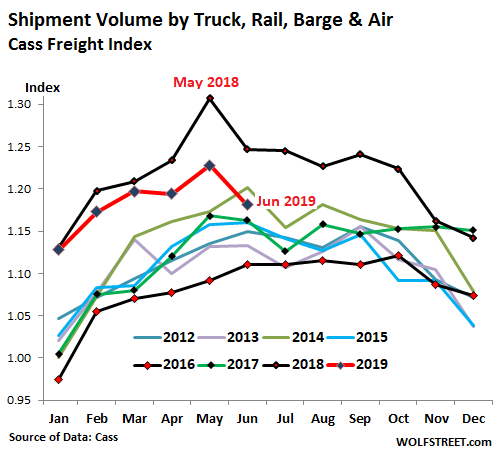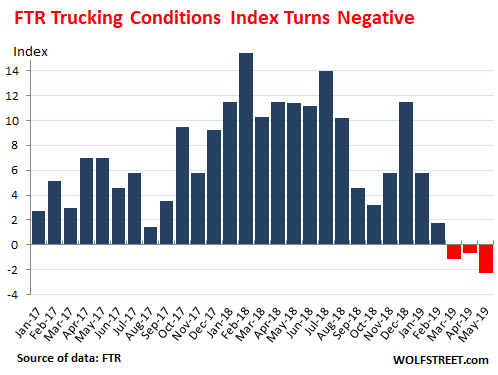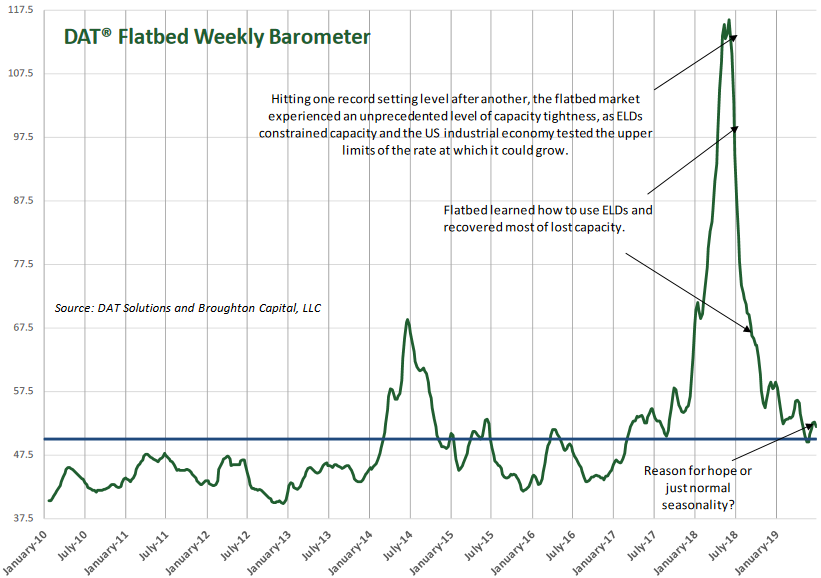After the boom comes the bust.
Freight shipments in the US across all modes of transportation – truck, rail, air, and barge – fell 5.3% in June compared to June last year, after having fallen 6.0% in May, the seventh month in a row of year-over-year declines, according to the Cass Freight Index for Shipments. This decline, along with other freight indicators, including orders for heavy trucks, now clearly outline the new Transportation Recession – number 2 since the Great Recession – in this very cyclical business:

In terms of freight traffic by rail, the Association of American Railroads (AAR) reported that in June overall, volume fell 6.3% from a year ago. The volume of intermodal freight – containers hauled by truck and then transferred to rail, or semi-truck trailers that piggyback on special rail cars – dropped 7.2% in June. For the first half, overall freight volume by rail was down 3.2%, with all segments in the red, except Petroleum and Petroleum Products, which was up 23%! Intermodal was down 3.3%.
The Cass Freight Index, which tracks shipments of consumer and industrial goods but not bulk commodities such as grains, has now fallen below the June 2014 level. June 2014 had set a record in shipments just before Transportation Recession 1 came along. The boom in 2018 broke the 2014 records, and by a big margin. And now the industry is back in its own recession.
In the stacked chart below of the Cass Freight Index, the red line denotes 2019 through June, which has now dipped below June 2014 (green line). Note how much of an outlier the boom of 2018 (black line at the top) had been, though it faded sharply at the end of last year:

Also today, FTR Transportation Intelligence reported that its Trucking Conditions Index for May fell deeper into the negative, the third month in a row in the red, from double-digit gains last year. The index tracks five key conditions in the truck market: Freight volumes, freight rates, fleet capacity, fuel price, and financing. A positive value “represents good, optimistic conditions,” FTR says. A negative value “represents bad, pessimistic conditions”:

“Most of the weakness is in the industrial sector, so trucking activity related to consumer demand should be relatively stronger than the rest of the industry,” explained Avery Vise, FTR’s VP of trucking.
One of the big industrial sectors is oil and gas drilling, and late last year, it entered the second oil bust since 2014, and now investment in the sector has slowed, even as production continues to surge. Another major industrial sector that has been in a downturn is residential construction. Industrial demand for transportation by truck shows up in demand for shipments by flatbed trailer. The DAT Flatbed Barometer, cited in the Cass Freight Index Report by Donald Broughton, has now completely unwound its historic spike of last year with a historic plunge (click to enlarge):
The average national spot rate for flatbed trailers, according to DAT Solutions, the largest truckload freight marketplace in the US, has fallen 18% in June from a year ago, to $2.30 a mile. The average spot rate for van trailers has also fallen 18% year-over-year, to $1.89 a mile.
Contract rates have started to tick down too, but not nearly as much, with van rates down 4.3% year-over-year and flatbed rates down 6.7%.
The plunge in spot rates impacts smaller trucking companies the most because they rely on the spot market. Contract rates mostly apply to larger trucking companies with major companies as clients. And the first batch of these smaller trucking companies are starting to fold.
On Thursday and Friday last week, news emerged that two more trucking companies had shut down. Less-than-truckload carrier LME Inc., headquartered in Roseville, Minnesota, with 30 delivery terminals in several states and hundreds of workers, suddenly shut down. And Timmerman Starlite Trucking in Ceres, near Modesto, California, which was specialized in transporting agricultural products and had 30 employees and 28 trucks, also suddenly shut down.
“We tried to provide a healthy work environment for our employees and give them the best wages and benefits we could,” said Starlite CEO Colby Bell, cited by the Ceres Courier. “But in the end, the rates that were available did not support the cost structure needed to compensate our employees appropriately.” He said that freight rates were about the same as 10 years ago, but costs have risen nearly 40% with additional regulations.
The transportation industry is very cyclical, with big ups and downs. After last year’s blistering boom comes the hangover. Some of that boom had to do with companies front-running potential tariffs and piling up inventories.
The last transportation recession, where the oil bust played a significant role, slowed down the overall economy, as services slowed as well, and in 2016, GDP grew only 1.6%, the lowest since the Great Recession but growth remained positive. So far this year, consumers and the services sector – which is far larger than the goods sector and includes the biggies of healthcare and finance – are holding up better than they’d done in 2016. But for the transportation sector, it will be tougher.
The cyclicality in trucking is also based on the classic mismatch in the timing of demand for transportation that creates a capacity crunch because there aren’t enough trucks, as it had done last year, that in turn creates a boom in orders of trucks. And when a few quarters later those trucks are being delivered, this is precisely when demand for transportation is starting to slow down, cycling the industry from capacity crunch to overcapacity in a very short time.
This mismatch is attested to by orders of heavy trucks that collapsed by about 70% year-over-year, even as sales of trucks that had been ordered last year rose to the highest level since 2006. Read… Truck Makers Are Going to Have to Fess Up Soon
Enjoy reading WOLF STREET and want to support it? You can donate. I appreciate it immensely. Click on the mug to find out how:
![]()



The trucking boom/bust is yet another example of how government interference distorts markets.
Tariffs are economic warfare and like conventional warfare there are net losses by all parties.
Traditionally, conservatives slam “government interference” and want a market-driven economy. Tariffs are the complete opposite of this – it’s government manipulating the market (some sectors, products; some companies), dicking around with price discovery, and upending the bedrock principle of the conservative ideal: “free markets”.
But the kool aiders can’t see it. They “just see what they want to see and disregard the rest”.
This transportation recession is a direct result of the tariffs.
HowNow – Should we remove all tariffs and only do business with countries that do the same? We would then be an entirely isolationist nation. All countries impose tariffs. The current individual in charge is just trying to level the playing field by putting pressure on the countries that have been taking advantage of our weaknesses for many years.
How would you suggest that we implement “free” trade? It would be interesting to hear a novel idea instead of political criticism.
We have had a schedule of tariffs for many years now. It’s called the “Harmonized Tariff Schedule” There’s another source to mediate tariffs, the WTO, which is time-consuming but our legal obligation to engage in when there are abuses by foreign countries. And tariffs should be agreed upon by committees and members of Congress, not just a supreme leader.
Are we a nation of laws? Can treaties be thrown out with each new President?
Russell, I should add that I consider myself a conservative. I actually care about deficits and govt. debt.
Regarding “free trade”, it’s not as simple as the Ayn Rand fans and libertarians think it is. It needs regulation. And companies need to control the “externalities” they’re responsible for, monopolies or duopolies are anathema to free trade, and need regulation, etc. Free trade is better than a centrally controlled economy, but free trade needs a rider and a harness.
Russell,
Since you mentioned the WTO. Ever since the inclusion of China in it, we’ve see a constant devaluation of Labor in the States and in Europe. Do you judge that as just simply coincidence?
Since the 70s with China and then later in the early 90s with the opening of Eastern Europe. There was 1 billion and 80 million people respectively joining the global market.
In your view, should US and Europe drop wages to match the new addition, or just continue brushing this issue under the rug with cheap credit and borrowing? How have the international trade organizations helps so far? How should the West regulate a communist country with an opaque government structure, insane corruption and equivalent of slave labor?
Now is that crucial moment where China’s “one child policy” demographic cliff “to use a Harry Dent” term, is at its Apex. Any trade pressure has maximum impact. As bad as Tariffs are for us consumers, there might be a silver lining in this trade spat.
The world can only import so much Chinese deflation before political blow back at home leads to more socialism and protectionism.
P.s. Just like with the “new” Nafta, the rhetoric is a lot worse then the rebranding.
We would have free trade if we settled our trade deficit in dollars instead of worthless treasury paper. The idea that America is the victim in all this is incredulous. The notion that China should make our products using cheap labor and not have access to the intellectual property is plantation mentality. The dollar as reserve currency is generally considered an extension of our military authority. Subsidize American products to American consumers at par value with that of imports and call off the tariffs.
Unbridled capitalism devours itself.
Regulations are at times warranted
>Tariffs are the complete opposite of this
no they are not. free market cannot work when only one of the two players refrain from government interference. you cannot compete under the premise of free trade with a chinese workforce that can survive on a bowl of ramen per day and whose government is aggressively devaluating its own currency. free market works within the boundaries of your own nation – everything else is just globalism.
Another government interference is the EPA regulations and electronic log books. In 2007 the EPA ramped up so much that the regulations were beyond engineering at that time. Cummins made a workable engine, but the post 2007 Cat engines had so many problems that Cat dropped out of the market when the tighter rules came out in 2010. At that point Cat dropped out of supplying engines for the class 8 trucks. In the type of trucks that I am familiar with, that meant that Cat went from 70% of the market in to 2007 to 0% in 2010. Now trucks have to inject DEF into the after-burner systems.
Same thing with electronic logs-people wanted a truck before this regulation went into affect.
Another government interference is the EPA regulations
Do you know what’s in your water?
Oh my.
you refer to the cummins engine as workable? I gave up on mine and retired-the check engine light/dpf crap finally got to me! California carb
is a mafia outfit!
My favorite (recent) oil quote, sort of hits on supply and demand imbalances”
“We’ve got refineries that want heavy oil and producers that make light oil.”
Go frackers!
re: “Timmerman Starlite Trucking in Ceres, near Modesto, California, which was specialized in transporting agricultural products and had 30 employees and 28 trucks, also suddenly shut down.”
Whoa … that’s in my neck of the woods. Never saw any of their trucks on the road, but probably not a good thing with harvests coming up.
re: ” In 2007 the EPA ramped up so much that the regulations were beyond engineering at that time. Cummins made a workable engine, but the post 2007 Cat engines had so many problems that Cat dropped out of the market when the tighter rules came out in 2010.”
Somewhat explains the popularity of ‘glider’ trucks which, I believe, put older, pre-regulations engines in new chassis and bodies.
China enacted tariffs on US agricultural product exports in response to US tariffs on Chinese manufactured product exports. This may have affected farm products shipping volumes.
JB Hunt Transport, the largest trucking firm in the US, just released earnings today which were only down 1.50% from year ago.
So they are not being hit hard yet.
Here’s an example: Hunt’s Intermodal shipments fell 8%. But prices up per load rose about 7% because their contract rates (some negotiated near the peak last year) are up as volume falls.
1) The DOW Industrial made a new all, but the Transport don’t confirm it.
The DJT peaked on Sep 14 last year.
Coming back from last Dec low, it made a lower high, forming
a head & shoulder.
2) The transport king was Neil Armstrong.
When Eisenhower was playing golf, Nikita Khrushchev launched
a Sputnik.
The DOW got a heart attack and and in Oct 1957 it fell to 419.79, on top of the 1929 peak, backingup, kissing good by to
28Y of misery (1929 – 1957).
I Like Mike summoned Wernher Von Braun and told him to do whatever it takes.
Silicon valley was born and Huntsville Ala became the
main engine thrust.
After 12Y of hard work, Nixon sent a rocket to the moon, on July 20 1969.
Nixon sent a rocket to the moon on July 16 1969, 50 years ago.
The warehouses must be full since the Trump trade tantrum. Importers must have sensed it and shipped ahead of schedule. We’re on the second day of what is supposed to be a very successful PRIME day with mostly 1-2 day delivery. Meaning the product is here. So how did it get there?
The only chart in that group in which June is lower than April is 2019
Walmart, Costco, Amazon are full of inventory. Even the Dollar stores are. Is there anything to worry about? Nah.
Is this a warning sign?
From Bloomberg:
“Almost overnight, a $693 million loan Clover Technologies took to the market five years ago lost about a third of its value. The startling nosedive stung even sophisticated investors, people who deal in the arcane business of trading corporate loans.”
“It immediately became a real life example of the perils of investing these days in the $1.3 trillion market for leveraged loans, where a global chase for yield has allowed an explosion in borrowing and lax underwriting. “
The Fed warned us in their Vulnerability Report. Don’t say noone was warned.
Did they say and admit WHO was responsible for that development?
More on this in about an hour ;-]
Is this from an article written in 2007 ? Sounds like it…
Has anyone done the math using the current order rate and the reported backlog of the truck manufacturers to figure out when they will have burned through the backlog and production numbers will have to tank?
The backlog is down to around 210,000 from something like 400,000 last year. It will likely fall below 200,000 by the end of this month. So that gives you a feel. Factories will cut production before the backlog gets too low.
JB Hunts analysts said good things are on the way in 2nd half of 2019. Are they tapped into the Delphi Oracle.
Someone has to deliver all the Prime Day orders
Punjabi owner/operators working for starvation rates are the folks pulling most of the Amazon Prime trailers.
“Hey Driver”
“Rickshaw America”
In order for the US to “overcome them” we must first, “become them”!
After a weak Q1, retail sales have rebounded sharply. It is hard to explain weak freight sales when retail sales have rebounded and will cause a GDP bump higher.
Retails are good b/c consumers are binging by using their CC!
How long this will last??
CC loans are at record. Making $ buy buying calls on MA, V and DFS!
Retail sales numbers out today. They look good, in my opinion.
A special shout out to all of you who called this 10 year expansion correctly.
A special shout out to all of you who called this 10 year temporary-emergency bank-bailing printed-money artificially-low-interest-rate deficit-spending share-buyback-manipulated asset-inflating middle-class-killing not-going-to-end-well expansion correctly.
Seems like an easy call with a little 20/20 hindsight…
There is intense conflicting data showing up!
Whom to believe?
More tomorrow!
It may not be ‘climate change; but I think weather maybe a big problem here. The constant rain over the plains and midwest has made planting difficult or impossible and the high water levels on Mississippi river has made barge traffic impossible. That should have benefitted trucking and rail as the alternative method of getting stuff to and from the ‘farm belt. But not if farmers can operate.
Once again ‘fracking’ seems to be the savior of our economy as Wolf St. notes oil and petroleum shipments by rail were up 23% and I suspect truck traffic to and from the oil fields up too.
I never thought I would cave in. But I bought the wife a Samsung Note S9 at the Prime day sale. I bought a pressure washer for my son.
Amazon gave my wife a hundred bucks rebate. Who is crazy enough not to buy. I bet retail rocketed in the last 2 days. Numbers for July will be through the roof. An outlier. This is Christmas in July. Trade wars forgotten. Ah, thanks Amazon.
More made in China junk that increased the trade deficit.
Less truckers,less pollution,gas and traffic,how is this bad.who cares!
CSX rail, just dropped after hours after missing. Any hope that rail will fair better than trucking? Your chart shows that this may just be the start of the sell-offs.
The CSX CEO cites “a slow drift down in demand.”
Maybe things are not so bad, as the broader market is holding up?
https://www.bloomberg.com/opinion/articles/2019-07-16/csx-s-slashed-outlook-sends-foreboding-message-about-the-economy?srnd=opinion
Have seen a number of regional LTL’s fold over the years. Could never understand how they could be competitive with nationals. Would you send a pallet to the west coast with an east coast regional? Sure they say they have agreements between them but every time a shipment switches systems, there are more opportunities for errors.
Suspect we’ll be seeing more regionals go down as things tighten up.
Hey Wolf! You’re on RT’s Kaiser Report!
5G, why is the US so far behind? (E1414) — RT Keiser Report https://www.rt.com/shows/keiser-report/465008-5g-telecom-monetary-systems